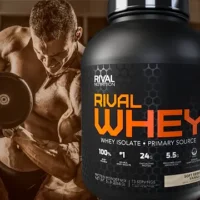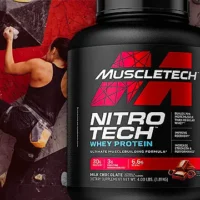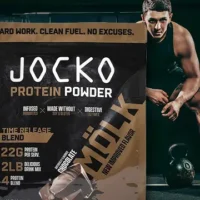Protein Guideprotein basics for beginners
Protein Sources
Protein can be found naturally from so many sources, so why do we need protein powders? Quite simply, it's because each of those whole foods can include large quantities of carbohydrates or fats. Protein powders offer a quick and lean solution to boost protein intake while minimizing the intake of unwanted extras.
While protein powders offer a more refined supplement for your protein needs, they come from a multitude of sources with their own benefits and drawbacks. We have provided an effective cheat-sheet below that covers the basics so you can make an informed choice based on your requirements.
While protein powders offer a more refined supplement for your protein needs, they come from a multitude of sources with their own benefits and drawbacks. We have provided an effective cheat-sheet below that covers the basics so you can make an informed choice based on your requirements.
Whey Protein
The most common protein supplement is whey protein, and for very good reason. Whey protein is made from milk and contains the highest content of essential amino acids for the lowest cost. Whey protein is rapidly digested, which makes it ideal for consumption after a workout when your body needs it most.
Whey concentrates are quite inexpensive and are ideally suited for weight loss. However, they do contain lactose which may make them less suitable for some people.
Whey Isolates are the most commonly used and offer the best value for athletes that require protein intake after a workout. Hydrolyzed Whey Isolates are ideally suited to elite athletes that require rapidly digesting protein and don't mind the added expense.
Recommended use: Whey is a fast digesting protein that is best used post-workout. Whey isolates in particular are digested very quickly and deliver amino acids immediately when your body needs them after a workout.
Concentrate Absorption Rate: 6 - 8 grams / hour
Isolate Absorption Rate: 8 - 10 grams / hour
Casein Protein
Most milk protein supplements are made from “whey”, but this only makes up about 20% of the protein found in milk. Whey is often used because it’s rapidly digested, so your body can make use of the essential amino acids quickly after exercise for muscle growth. However, Casein makes up the other 80% of the protein in milk and has unique benefits of its own.
In comparison to whey, casein is not digested quickly. Its peptide and micelle structure is disturbed by the acid in your stomach and this causes the casein to form a gelatinous structure which slows the digestion process. This means that rather than flooding your body with essential amino acids, it forms a steady flow of amino acids over a far longer period of up to 7 hours. While this may not be useful after a workout, it makes casein ideal for its anti-catabolic state while sleeping. The use of casein before sleep maintains muscle mass and reduces muscle cell breakdown during your sleep.
Recommended use: Casein protein is best used by athletes directly before bed in order to maintain an anti-catabolic state. This prevents your body from burning muscle tissue for energy during the night. For weight-loss it can also be taken in the mornings to reduce cravings during the day.
Absorption Rate: 1.5 - 2 grams / hour
Recommended use: Casein protein is best used by athletes directly before bed in order to maintain an anti-catabolic state. This prevents your body from burning muscle tissue for energy during the night. For weight-loss it can also be taken in the mornings to reduce cravings during the day.
Absorption Rate: 1.5 - 2 grams / hour
Egg Protein
Eggs have been the favored source of protein since long before powdered supplements became popular. There is good reason for this, as eggs are the most concentrated naturally occurring source of protein. Athletes have used this bioavailable source to naturally increase their protein intake for more than a century.
Egg protein powder is a complete protein source including all of the essential amino acids. It has no lactose so is ideal for those that are lactose intolerant. Egg protein generally has a very low carb content, no cholesterol, and is a high source of vitamins and minerals.
Recommended use: Egg white protein has been used by athletes and bodybuilders alike for decades. This slower digesting protein offers an alternative to casein for those with a dairy intolerance.
Absorption Rate: 1.5 - 3 grams / hour
Recommended use: Egg white protein has been used by athletes and bodybuilders alike for decades. This slower digesting protein offers an alternative to casein for those with a dairy intolerance.
Absorption Rate: 1.5 - 3 grams / hour
Beef Protein
Beef protein has become a popular alternative to dairy-based protein powders for athletes and bodybuilders alike.
It has a complete essential amino acid profile as well as being high in creatine content. This makes beef protein powder an ideal supplement for muscle development. Also, beef protein powder is often close to 99% pure in isolate form, with minimal to no fat or cholesterol remaining.
Recommended use: Beef protein offers an alternative to whey for use directly after exercise. It provides exceptional amino acid delivery for muscle repair and growth.
Absorption Rate: 1 - 3 grams / hour
Recommended use: Beef protein offers an alternative to whey for use directly after exercise. It provides exceptional amino acid delivery for muscle repair and growth.
Absorption Rate: 1 - 3 grams / hour
Pea Protein
Many would dismiss the humble pea for their protein source, but pea-sourced protein has a lot going for it. Not only is it fat, cholesterol, gluten, and lactose-free, but it has high levels of amino acids.
Pea protein powder is especially rich in lysine and glutamine. However while it does contain all essential amino acids, it is very deficient in certain amino acids and should not be used as a primary source. We would recommend using a blended product or using multiple products to ensure a good supply of all the essential amino acids. If you are looking for a hypoallergenic protein powder, this is one to consider.
To get the full benefit of all of the essential amino acids we recommend combining rice and pea protein. These two proteins complement each other and provide a good balance of the essential amino acids needed.
Recommended use: Pea protein offers an exceptional source of essential amino acids when combined with rice protein. It also contains natural properties which make it ideal as a weight-loss protein source. For weight loss, it's best used in the morning as a meal replacement. Research has shown a high-protein breakfast considerably reduces cravings throughout the day.
Absorption Rate: 3 - 4 grams / hour
To get the full benefit of all of the essential amino acids we recommend combining rice and pea protein. These two proteins complement each other and provide a good balance of the essential amino acids needed.
Recommended use: Pea protein offers an exceptional source of essential amino acids when combined with rice protein. It also contains natural properties which make it ideal as a weight-loss protein source. For weight loss, it's best used in the morning as a meal replacement. Research has shown a high-protein breakfast considerably reduces cravings throughout the day.
Absorption Rate: 3 - 4 grams / hour
Rice Protein
While you would have to eat more than just a bowl of rice to gain any real benefit, brown rice protein powder surprisingly does work. In studies, it has been shown to offer similar benefits to whey protein powder.
However, rice protein powder tends to be very low in some amino acids, especially lysine. So while this powder can be an economical choice, we wouldn’t recommend using it as a sole protein supplement. We recommend using it with other sources of protein to ensure you are not missing out on some important essential amino acids.
To get the full benefit of all of the essential amino acids we recommend combining rice and pea protein. These two proteins complement each other and provide a good balance of the essential amino acids needed.
Recommended use: Pea protein offers an exceptional source of essential amino acids when combined with rice protein. It also contains natural properties which make it ideal as a weight loss protein source. For weight loss, it's best used in the morning as a meal replacement. Research has shown a high-protein breakfast considerably reduces cravings throughout the day.
Absorption Rate: 2 - 3 grams / hour
To get the full benefit of all of the essential amino acids we recommend combining rice and pea protein. These two proteins complement each other and provide a good balance of the essential amino acids needed.
Recommended use: Pea protein offers an exceptional source of essential amino acids when combined with rice protein. It also contains natural properties which make it ideal as a weight loss protein source. For weight loss, it's best used in the morning as a meal replacement. Research has shown a high-protein breakfast considerably reduces cravings throughout the day.
Absorption Rate: 2 - 3 grams / hour
Soy Protein
Soy protein powder is perhaps the best plant-based source of protein worth considering. As an abundantly available low-cost protein source, it also has one of the best amino acid profiles. It includes all of the essential amino acids that your body needs.
In studies, it has been shown to perform comparably with whey protein in terms of promoting muscle growth. It has also been shown that the isoflavones in soy protein can help reduce the risk of cancer as well as cardiovascular disease.
Recommended use: Soy protein is a naturally complete plant-based protein that includes some great properties. However, we actually recommend minimizing a high soy diet as it has been shown to affect hormone levels, including testosterone levels.
Absorption Rate: 4 grams / hour
Recommended use: Soy protein is a naturally complete plant-based protein that includes some great properties. However, we actually recommend minimizing a high soy diet as it has been shown to affect hormone levels, including testosterone levels.
Absorption Rate: 4 grams / hour
Hemp Protein
Hemp sourced protein might seem like an unusual option but has some unique properties which make it an option worth considering. Hemp protein powder is high in fiber in addition to its protein content.
Hemp includes all of the essential amino acids your body needs. It also proves to be a good source of omega-3 and omega-6 fats. Hemp protein has also been shown to lower blood pressure, cholesterol and helps bolster your immune system. On the downside, hemp protein powder can be quite expensive due to its limited source.
Recommended use: Hemp is a little slower digesting than other plant-based proteins so it's best used pre-workout. However, hemp is more suitable for use as a weight loss protein or as a meal replacement.
Absorption Rate: 2 - 4 grams / hour
Recommended use: Hemp is a little slower digesting than other plant-based proteins so it's best used pre-workout. However, hemp is more suitable for use as a weight loss protein or as a meal replacement.
Absorption Rate: 2 - 4 grams / hour
How do I use protein powder?
Beginners Protein
The content on this site has not been written, reviewed or endorsed by a medical professional. We assume no liability for the misuse of supplements and recommend you review the label of any product, as well as consulting with your health care professional.
We are a participant in the Amazon Services LLC Associates Program, an affiliate advertising program designed to provide a means for us to earn fees by linking to Amazon.com and affiliated sites.
We are a participant in the Amazon Services LLC Associates Program, an affiliate advertising program designed to provide a means for us to earn fees by linking to Amazon.com and affiliated sites.
© 2025 ProteinPowder.com


